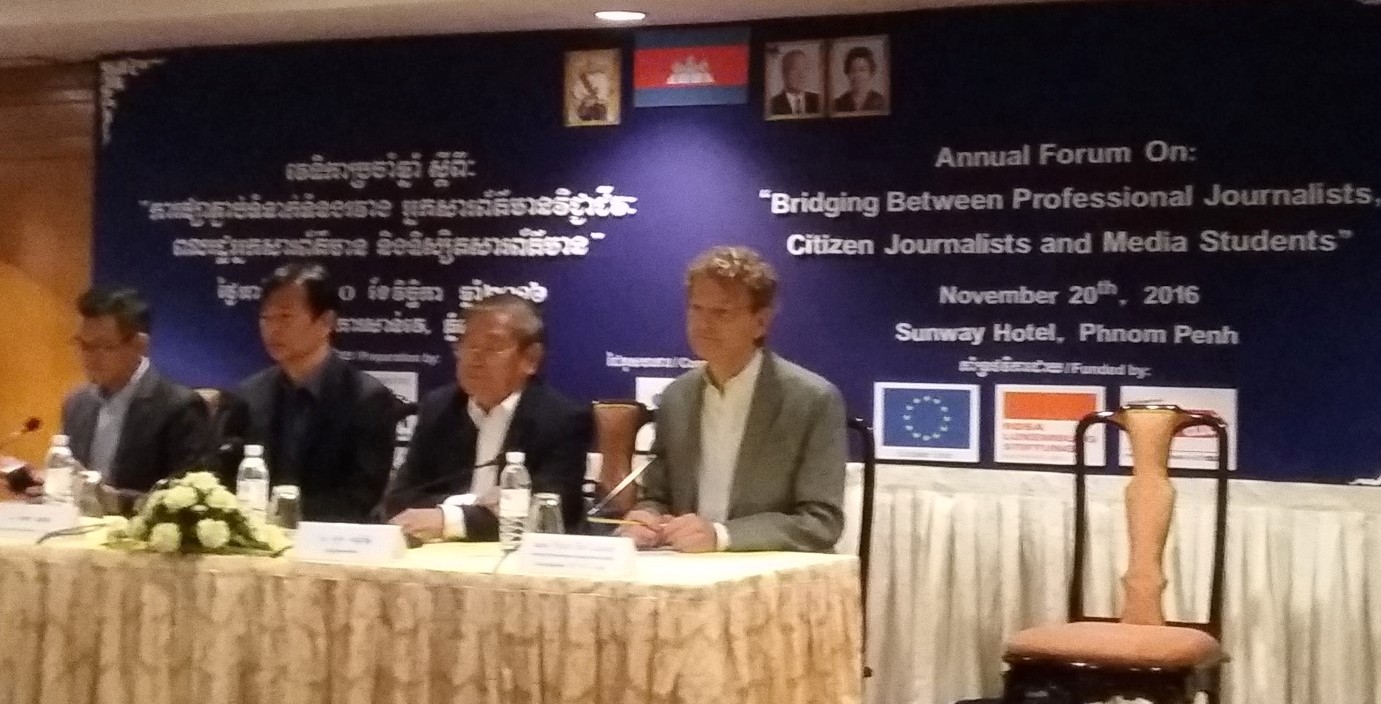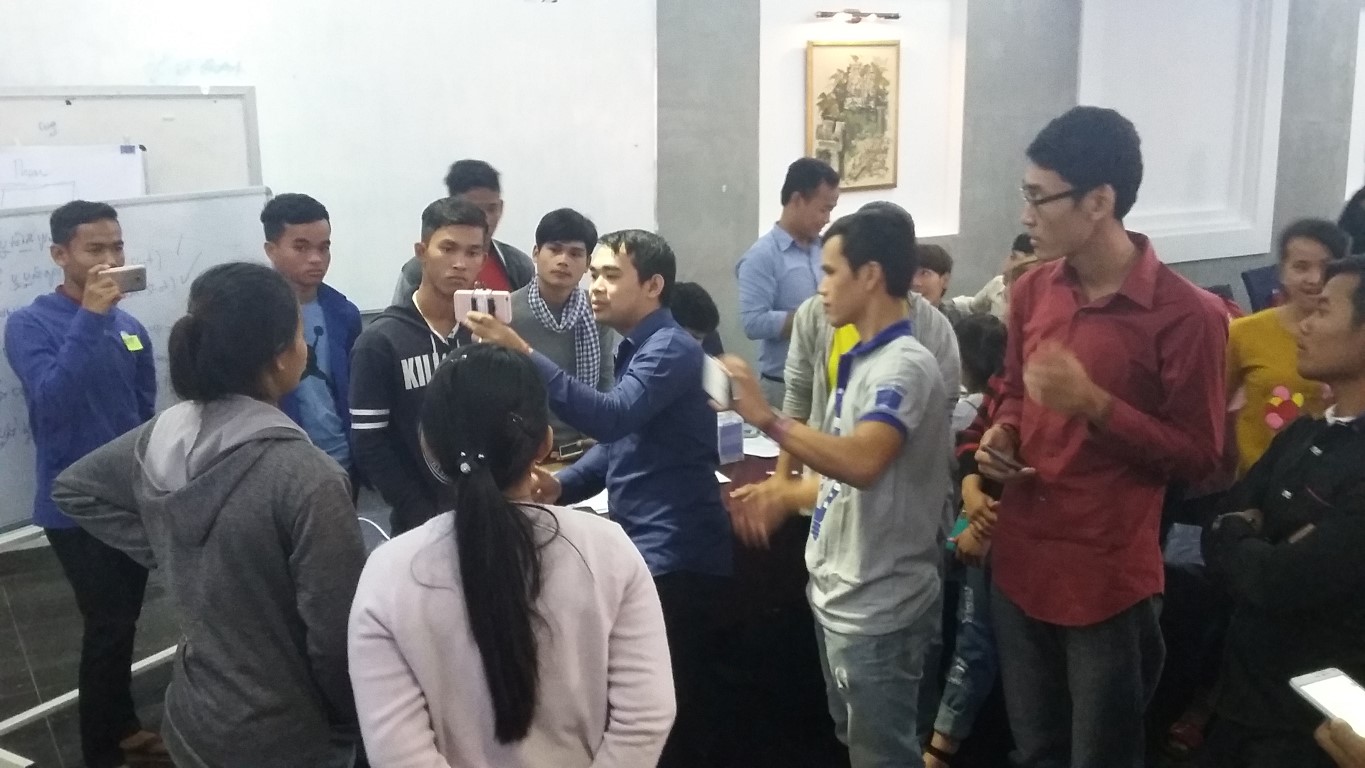 |
While Citizen Journalists (CJs) and Professional Journalists (PJs) work to achieve the ultimate goal of fact finding and reporting, it is obvious that CJs remain, to some extent, far behind PJs, given the lack of technical skills and experience.
To cope with these challenges, the annual “Bridging Forum,” organized by Cambodian Center for Independent Media (CCIM), a leading institution in training CJs, was held on November 20, 2016 with the participation of His Excellency Khieu Kanharith, Minister of Information, representatives from CCIM’s partners, professional journalists, citizen journalists and university students.
The goal of the forum is not only to narrow the gaps in technical skills through the sharing of knowledge and experience, but also to strengthen and expand the network of cooperation between Citizen Journalists, Professional Journalists and students in journalism so that they are able to work hand in hand to promote freedom of press and expression in Cambodia.
The emerging of Citizen Journalists (CJs) has produced a great positive impact on the media. The information dissemination by CJs, however, has never gone unchallenged. Ms. Nov Srey Pov, who was trained by CCIM and started working as CJs since 2014 recalled her experience “local authorities confiscated my phone and my camera while I was videotaping and trying to report the case of violence against street vendors in Phnom Penh.”
“Later on, I was arrested by authorities simply because I am journalist with no institution,” also said Srey Pov. Mr. Mab Suy, a CJ from Porsat province who shared a similar case when his phone and camera were taken while he was attempting to videotape a case that traffic cops extort money from the motorbike owner. “The police seized my phone and deleted the video clip I recorded. They actually threatened that I would face consequences if I dare to report or share the clip with others,” said Mr. Suy.
Violence and abuses of human rights exist at every corner of Cambodian society. Ms. So Sophany, a representative of CJs from entertainment sector supported by the project of Rosa Luxemburge Stiftung, said violence and abuses committed by customers (mostly men) against women working in entertainment sectors happen almost every single day.
According to Sophany the solutions, if ever found by, are always in favor of customers. “No justice is for us,” said Sophany, who acknowledged that the training of CJ in deed enabled her and her colleagues to understand how to report and who she and her colleagues can ask for legal consultation and intervention when facing violence and human rights abuses.
Accepting the challenges including security risks, the only thing PJs have always depended on to deal with challenges is “codes of ethic.” Mr. Peter Bo Larsen, country director of DanChurchAid Cambodia, pointed out that trust, harm minimization, corruption free and transparency are the four key codes of ethics in journalism.
Mr. Chhay Sophal, a project manager at UNESCO and lecturer at Department of Media and Communication, Royal University of Phnom Penh agreed and acknowledged that CJs contribute to more transparency and less corruption in society just exactly like what PJs do. Freedom of expression, as Mr. Sophal cautiously explained, should never be understood as freedom of defamation and groundless charges.
Former Radio France International editor-in-chief Pen Bona, who is now an editor-in-chief at PNN TV pointed out that even though CJs have no institution to refer to, this issue is solved by building reputation and confidence. That is to follow to code of ethics. The PNN TV welcomes reports by CJs if the sources are well verified.
Security guarantee, according to Mr. Nop Vy, a media director of CCIM and a guest speaker at the forum, is a difficult question. The difficulty, as Mr. Vy are optimistic, should not necessarily be interpreted as impossibility, given the options and what CCIM is working on, such as increasing visibility of sign on journalist’s light jacket with clear logo or either CCIM or VOD, forming a strong network to promptly respond and accepting no money in exchange for news reports. Referring to countless cases of great news reports written by freelance journalists, Mr. Vy, who has years of experience in journalism, is strongly convinced that the real problem is not about institution but code of ethics and skills.
In addition to interaction between CJs and PJs, university students were give opportunities to engage and learn. Miss Rim Phat Bopha Phoung, a newly-trained CJ and a senior at Khemarak University, argued that writing a short and precise news report is what inspired her the most and she did not know that before she attended the training.
Not different from Bopha Phoung, Miss Tep Leang Ang, student of business communication at Pannasastra University of Cambodia, claimed that the forum actually provided her knowledge and experience where she can never earn at the university she is attending. Miss Chorn Chan Bota, a student from Department of Media and Communication, Royal University of Phnom Penh, argued that the forum is very important in the sense that it helps reflect the reality of media sector, in which CJs and PJs are working to achieve the same ultimate goal, getting people informed the truth.
CCIM initiated to hold annually the “Bridging Forum” since 2013. Experience from the three previous forums vindicates that linking CJs and PJs and students of journalism together is critically important to improve the media sector. Besides sharing knowledge and experience and expanding the network of cooperation, the forum plays a key role in inspiring young students to participate in reporting, which eventually leads to the promotion of the freedom of press, freedom of expression, human rights and democracy. (Sek Sophal)


